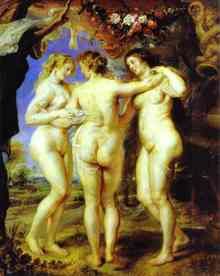In a discussion elsewhere, I was reminded of British artist and critic (or perhaps, more accurately, artist critic) Matthew Collings, whose BBC series and accompanying book This is Modern Art from the late ’90s helped me immensely in developing the ability to appreciate contemporary nonrepresentational art.
He did a 2003 follow-up series called Matt’s Old Masters, which I haven’t seen (though now that I’m reminded I’ll order the book version), but I remembered a fascinating little essay he wrote about the general thrust of it that ran in the New Statesman. Turns out the piece is still  available online:
available online:
The key to Rubens is something that is before our eyes when we’re looking at his work, but which we’re not necessarily aware that we’re seeing. It’s not fat, sentimental nudity. We’re not interested in that any more. And if we are interested in royalty, it’s not because we believe the royals’ power comes from heaven, but because we suspect that they don’t deserve power at all and we want to see them cut down to size. Old mythological stories are of no interest to us, either, unless they’ve been recycled by Hollywood into science-fiction movies. Fatties, royals and mythology – they’re all dead to us. But there is something we do always want which Rubens supplies, and that’s pleasure. The form for it is painting itself, its capacity to be a language of pure feeling.
Imagine you’re in the Prado now, in front of Rubens’s The Three Graces: three life-size nude women. Now I’m going to tell you something about those outrageously big bottoms that I hope will simultaneously illuminate them and make them disappear. The pleasure isn’t in what you think is before you: an artificial, distant and slightly tedious scene. You recognise what the painting is of, but you don’t realise that it is also doing something mysterious. You believe in the illusion so much that you don’t see that it’s constructed out of melting paint. Focus on this. This is the bit that’s for you. It’s the bit that’s still alive, that’s connected to Rubens’s own nervous system. What he felt as he painted those brush strokes is the feeling that you’re now having: he wanted pleasure and so do you. And now you’re both getting it.
It’s worth reading the whole thing.
I don’t know, I got nothing against fat, sentimental nudity.
I’m against the sentimental part!
Be hard to argue that it’s a “fashionable” art motif that you see everywhere NOW though.